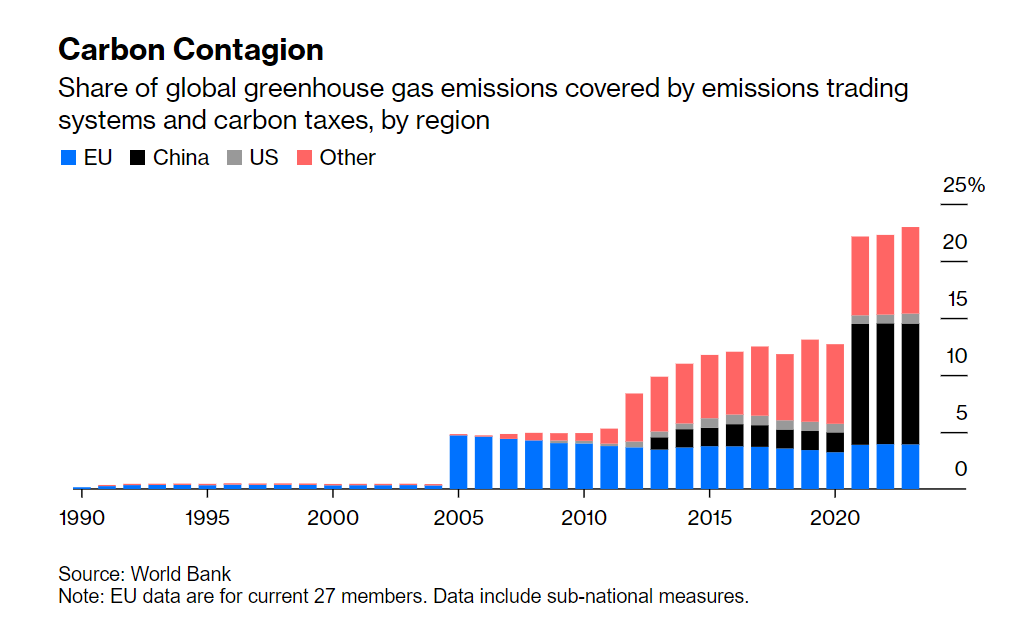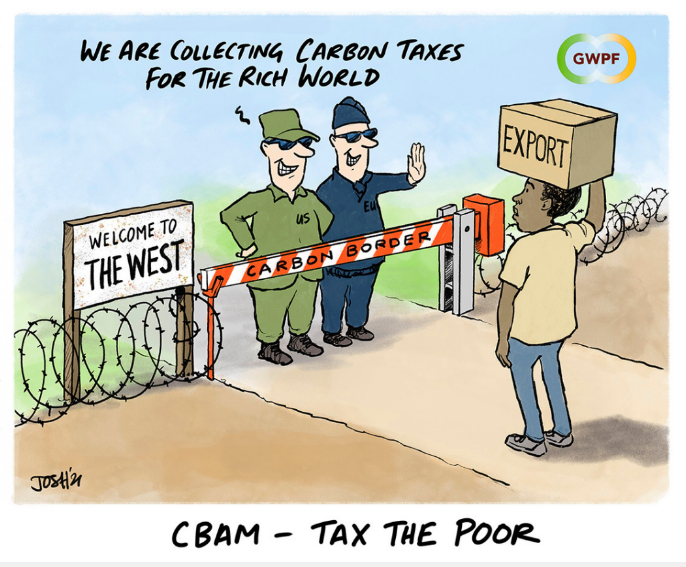via MishTalk:
The EU has a Carbon Border Adjustment Mechanism (CBAM). The Sierra Club wants one. So do two Republican Senators: Lindsey Graham (SC) and Bill Cassidy (LA).

Sierra Club Carbon Market Proposal
Let’s start with a look at the Sierra Club’s Carbon Market Proposal.
The Sierra Club recognizes that, of the many identified greenhouse gases, carbon dioxide (CO2) emissions are the primary cause of global climate change.
The United States should adopt a comprehensive climate change strategy, consistent with the U.N. Framework Convention on Climate Change. The strategy must provide a broad array of components to reduce CO2 emissions, including policies and incentives for promoting efficiency, conservation and renewable energy. Putting an adequate fee on pollution from carbon dioxide and other greenhouse gases to reflect their true costs would provide one such incentive. Any strategy must protect natural systems and species and promote environmental and economic justice.
Carbon emission fees will directly establish a cost associated with CO2 emissions.
Foreign Pollution Fee Act
Now lets consider the Foreign Pollution Fee Act press release by Bill Cassidy, citing himself, emphasis mine.
“China is challenging the United States militarily, geopolitically, and economically. These challenges are connected, and the right response must address all three. The answer is a single new policy: a foreign pollution fee. This fee will target imports that are produced with higher greenhouse gas emissions than American-produced goods,” wrote Dr. Cassidy.
“To counter China, the United States should make use of a clear competitive advantage—its ability to produce with comparatively low greenhouse gas emissions. It is unacceptable for China, or any country, to both freely pollute and export to the United States. Allowing it to do so effectively rewards Beijing for practices Washington does not permit at home. Instead, the United States should use its capacity for low-emission manufacturing and energy production for its own geopolitical and economic gain. It must enact policies that bolster the U.S. economy by encouraging more American production while creating opportunities for the expanded trade of cleanly produced goods at home and abroad,” continued Dr. Cassidy. “This is why I will be submitting legislation calling for a foreign pollution fee. The fee is not a domestic carbon tax. It does not prevent the continued use of U.S. natural resources. Its purpose is to enhance American security and competitiveness, streamline domestic permitting processes, and safeguard the environment, not put a larger burden on American energy producers and job creators.”
Spotlight on CBAM

On December 19, 2022 I noted EU Imposes the World’s Largest Carbon Tax Scheme, Inflationary Madness Sets In
CBAM is part of the “Fit for 55 in 2030 package”, which is the EU’s plan to reduce greenhouse gas emissions by at least 55% by 2030 compared to 1990 levels in line with the European Climate Law.
Please consider Europe Tries to Stop Exporting Its Emissions.
Given the self-imposed cost of going green, the CBAM explicitly looks to make European manufacturers more competitive with foreign producers. Europe says that’s fair. In compliance with World Trade Organization rules, it isn’t discriminating against any particular country, just leveling the playing field.
But this means top trading partners like the U.S. will now face a steep carbon bill when docking at the ports of Rotterdam or Antwerp.
The U.S. has attempted to discourage the CBAM. Climate envoy John Kerry warned Europe against proceeding with the border tax, saying last year that “the United States has strong feelings about not having excessive regulation.”
Biden has “strong feelings about not having excessive regulation,” says John Kerry.
What a Hoot!
The world has gone mad. Now two Republican Senators support CBAM, even citing climate change as one of the reasons.
The Fee is a Carbon Tax
The fee is a carbon tax. But let’s not call it a tax. Let’s call it a Carbon Border Adjustment Mechanism (CBAM).
Nah, that’s already taken. So let’s call it a Foreign Pollution Fee Act (FPFA) instead.
“This fee will target imports that are produced with higher greenhouse gas emissions than American-produced goods,” wrote Dr. Cassidy.
Who Else is In Favor?
- The Senate’s leading offshore wind proponent, Democrat Sheldon Whitehouse
- Citizens for Responsible Energy Solutions (CRES) President Heather Reams
- Climate Leadership Council CEO Greg Bertelsen
- Battery Materials and Technology Coalition Spokesperson Ben Steinberg
- American Iron and Steel President & CEO Kevin Dempsey
- BASF Vice President & Deputy General Counsel for Regulatory, Environmental & Government Affairs Catherine Trinkle
- Portland Cement Association Senior Vice-President of Government Affairs Sean O’Neill
- Steel Manufacturers Association President Philip Bell
Whitehouse was noted by the WSJ, the rest were touted by Cassidy.
Bloomberg on Foreign Pollution Fee Act
Please consider GOP Senator Backs Carbon Tax, Just by Another Name
Senator Bill Cassidy of Louisiana, a Republican, recently proposed a bill for a Foreign Pollution Fee Act. This would impose tariffs on imports of goods in 16 industrial sectors based on their greenhouse-gas intensity, as determined by federal bodies. Calculated as a percentage of value, rather than a flat amount, and assessed on intensity relative to what’s seen in the US, the somewhat convoluted bill doesn’t set an explicit carbon price.
Cassidy cites the EU’s own regulations as a motivating factor, saying carbon-intensive Chinese exports priced out of Europe might be dumped into the US.
The CBAM is an inevitable outgrowth of the EU’s Emissions Trading System, which forces industry there to reduce emissions or pay for carbon permits. The CBAM imposes a cost on imports from foreign competitors that aren’t subject to the same sort of carbon pricing in their own jurisdictions, thereby preventing them from undercutting EU companies. Ultimately, if you engineer a situation whereby instead of buying appliances from lower-carbon domestic manufacturers, your citizens buy cheaper imports from a coal haven, you end up with climate change and deindustrialization. The old lose-lose.
What About Developing Nations?
Bloomberg commented “Developing countries with less history of emissions or resources to build prosperous net-zero economies have particular reason to fear, and be angered by, such trade barriers.“
I listed many examples of the impact on developing nations in my report on CBAM.
Republicans for a Carbon Tax
The Wall Street Journal notes Republicans for a Carbon Tax
The Foreign Pollution Fee Act, sponsored by Louisiana’s Bill Cassidy and South Carolina’s Lindsey Graham, could well have been written by the Sierra Club and AFL-CIO. Among the carbon tariff’s biggest advocates is Donald Trump’s former trade adviser Robert Lighthizer, who favors tariffs in principle.
The bill would impose tariffs on 16 categories of goods produced in countries with higher CO2 emissions than the U.S. They include steel, aluminum, critical minerals, solar panels, wind turbines, crude oil, gasoline, petrochemicals, plastics, paper and lithium-ion batteries. Companies could lobby to have products added to the list, and you can bet they will.
The bill would expand the administrative state by creating a new bureaucracy with sweeping powers that would be hard for future Congresses to rein in.
U.S. production of most goods on the tariff list doesn’t come close to meeting domestic demand. Yet tariffs could be reduced only in limited circumstances—namely, for national security needs or if U.S. companies produce less than 5% of domestic demand. That means importing businesses won’t have an alternative to paying the tariffs, which would be filtered through supply chains and passed to consumers.
The Louisiana Senator is also selling the bill with a misdirection worthy of Al Gore. The bill defines “pollution” as “greenhouse gas emissions.” This is a gift to Democrats who have been trying to codify the Supreme Court’s misconceived Massachusetts v. EPA (2007) ruling that let the Environmental Protection Agency regulate greenhouse gases as pollutants. This is the Administration’s legal justification for its back-door ban on gas-powered cars.
The Senate’s leading wind producer, Democrat Sheldon Whitehouse, is praising the Cassidy-Graham bill, which he says “creates the negotiating space to try to come with a bipartisan agreement.” Senate Democrats last Congress introduced two carbon tariff bills, which have the added virtue for progressives of raising revenue they can spend.
Shades of Obama’s Cap and Trade
Who would have thought two Republican Senators would be endorsing a global carbon tax scheme essentially the same as originally proposed by President Obama?
Does Trump endorse this monstrosity? I cannot find a direct reference. But Donald Trump’s former trade adviser Robert Lighthizer, favors tariffs in principle. So does Trump himself. And Biden kept all of Trump’s tariffs intact, expanding most of them.
House Speaker Mike Johnson’s Grace Period is Over, What’s Next?
Yesterday, I commented House Speaker Mike Johnson’s Grace Period is Over, What’s Next?
“We’re on the job now. We’re going to make it happen,” said Johnson this week. Really? Make what happen?
Bipartisan support for general climate madness and more bureaucracy is amazing. Yet people keep telling me that eight House Republicans can change things.
The best we can possibly hope for now is no change at all. Otherwise we are likely to see the incredibly inflationary Foreign Pollution Fee Act pass.
The Foreign Pollution Fee Act is sponsored by Republicans but appears to be a joint effort of AOC, Elizabeth Warren, Obama, and Biden.
Unless Trump comes out against this bill, and possibly even if he does. this is where we are headed.
Mercy!